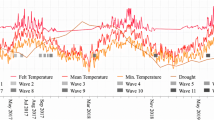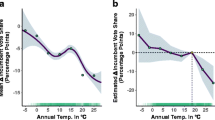Abstract
Do temperature anomalies affect political polarization over global warming? Americans’ attitudes about global warming are affected by whether they reside in states experiencing unseasonably warm (or cold) temperatures versus those experiencing milder temperatures. Specifically, in terms of causal attribution, political polarization over global warming is more pronounced in states experiencing temperature anomalies. Using pooled data collected during 2013–2014, this study utilizes logistic regression to explore how temperature anomalies exacerbate the political polarization among Americans over perceptions of whether global warming impacts are immediately evident as well as the attribution of global warming to human activity. Results indicate that very cold or warm temperature anomalies from a 5-year baseline predict perceptions of global warming impacts and exacerbate existing political polarization over the causal attribution of global warming. These effects are particularly noticeable among Democrats. This analysis provides a contribution to understanding how temperature anomalies from the recent past shape the sociophysical context of global warming attitudes.



Similar content being viewed by others
Notes
These data were downloaded through the Inter-university Consortium for Political and Social Research (ICPSR), study numbers 34993, 34998, 36195, and 36198.
These data were downloaded at www7.ncdc.noaa.gov/CDO/CDODivisionalSelect.jsp (accessed November 2016).
References
Akerlof K, Maibach EW, Fitzgerald D, Cedeno AY, Neuman A (2013) Do people “personally experience” global warming, and if so how, and does it matter? Glob Environ Chang 23:81–91
Antonio RJ, Brulle RJ (2011) The unbearable lightness of politics: climate change denial and political polarization. Sociol Q 52(2):195–202
Baldassarri D, Gelman A (2008) Partisans without constraint: political polarization and trends in American public opinion. Am J Sociol 114(2):408–446
Bohr J (2014) Public views on the dangers and importance of climate change: predicting climate change beliefs in the United States through income moderated by party identification. Clim Change 126:217–227
Bohr J (2016) The ‘climatism’ cartel: why climate change deniers oppose market-based mitigation policy. Environ Polit. doi:10.1080/09644016.2016.1156106
Boussalis C, Coan TG (2016) Text-mining the signals of climate change doubt. Glob Environ Chang 36:89–100
Boykoff MT (2013) Public enemy no. 1? Understanding media representations of outlier views on climate change. Am Behav Sci 57(6):796–817
Brulle R (2014) Institutionalizing delay: foundation funding and the creation of U.S. climate change counter-movement organizations. Clim Change 122:681–694
Brulle RJ, Carmichael J, Jenkins JC (2012) Shifting public opinion on climate change: an empirical assessment of factors influencing concern over climate change in the U.S., 2002–2010. Clim Change 114:169–188
Bulkeley H (2000) Common knowledge? Public understanding of climate change in Newcastle, Australia. Public Underst Sci 9:313–333
Capstick SB, Pidgeon NF (2014) Public perception of cold weather events as evidence for and against climate change. Clim Change 122:695–708
Cutler MJ (2016) Class, ideology, and severe weather: how the interaction of social and physical factors shape climate change threat perceptions among coastal US residents. Environ Sociol 2(3):275–285
Deryugina T (2013) How do people update? The effects of local weather fluctuations on beliefs about global warming. Clim Change 118:397–416
Donner SD, McDaniels J (2013) The influence of national temperature fluctuations on opinions about climate change in the U.S. since 1990. Clim Change 118:537–550
Dunlap RE, Jacques PJ (2013) Climate change denial books and conservative think tanks: exploring the connection. Am Behav Sci 57(6):699–731
Dunlap RE, McCright AM (2008) A widening gap: republican and democratic views on climate change. Environ 50:26–35
Egan PJ, Mullin M (2012) Turning Personal Experience into Political Attitudes: The Effect of Local Weather on Americans’ Perceptions about Global Warming. J Polit 74(3):796–809
Farrell J (2016) Corporate funding and ideological polarization about climate change. Proc Natl Acad Sci 113(1):92–97
Feldman L, Maibach EW, Roser-Renouf C, Leiserowitz A (2012) Climate on cable: the nature and impact of global warming coverage on fox news, CNN, and MSNBC. Int J Press Polit 17(1):3–31
Fiorina MP, Abrams SJ, Pope JC (2005) Culture war? The myth of polarized America. Pearson Longman, New York
Fisher DR, Waggle J, Jasny L (2015) Not a snowball’s chance for science. Contexts 14(4):44–49
Guber DL (2013) A cooling climate for change? Party polarization and the politics of global warming. Am Behav Sci 57(1):93–115
Hamilton LC (2008) Who cares about polar regions? Results from a survey of U.S. public opinion. Arct Antarct Alp Res 40:671–678
Hamilton LC (2011) Education, politics and opinions about climate change: evidence for interaction effects. Clim Change 104:231–242
Hamilton LC, Keim BD (2009) Regional variation in perceptions about climate change. Int J Climatol 29:2348–2352
Hamilton LC, Lemcke-Stampone M (2014) Arctic warming and your weather: public belief in the connection. Int J Climatol 34:1723–1728
Hamilton LC, Safford TG (2015) Environmental views from the coast: public concern about local to global marine issues. Soc Nat Res 28(1):57–74
Hamilton LC, Saito K (2015) A four-party view of US environmental concern. Environ Polit 24(2):212–227
Hamilton LC, Stampone M (2013) Blowin’ in the wind: short-term weather and belief in anthropogenic climate change. Weather Clim Soc 5:112–119
Hamilton LC, Colocousis CR, Duncan CM (2010) Place effects on environmental views. Rural Soc 75(2):326–347
Hamilton LC, Cutler MJ, Schaefer A (2012) Public knowledge and concern about polar-region warming. Polar Geogr 35(2):155–168
Howe PD, Markowitz EM, Lee TM, Ko CY, Leiserowitz A (2012) Global perceptions of local temperature change. Nat Clim Chang 3:352–356
Hulme M, Dessai S, Lorenzoni I, Nelson DR (2009) Unstable climates: exploring the statistical and social constructions of ‘normal’ climate. Geoforum 40:197–206
Jacques PJ, Dunlap RE, Freeman M (2008) The organisation of denial: conservative think tanks and environmental scepticism. Environ Polit 17(3):349–385
Jones BD, Baumgartner FR (2005) The politics of attention: how government prioritizes problems. University of Chicago Press, Chicago
Jost JT, Glaser J, Kruglanski AW, Sulloway FJ (2003) Political conservatism as motivated social cognition. Psychol Bull 129(3):339–375
Konisky DM, Hughes L, Kaylor CH (2016) Extreme weather events and climate change concern. Clim Change 134(4):533–547
Krosnick JA, Holbrook AL, Visser PS (2000) The impact of the fall 1997 debate about global warming on American Public Opinion. Public Underst Sci 9:239–260
Lamb PJ, Changnon SA (1981) On the “Best” temperature and precipitation normals: the Illinois situation. J Appl Meteorol 20(12):1383–1390
Livezey RE, Vinnikov KY, Timofeyeva MM, Tinker R, van den Dool HM (2007) Estimation and extrapolation of climate normals and climatic trends. J Appl Meteorol Climatol 46:1759–1776
Malka A, Krosnick JA, Langer G (2009) The association of knowledge with concern about global warming: trusted information sources shape public thinking. Risk Anal 29:633–647
Marquart-Pyatt ST, McCright AM, Dietz T, Dunlap RE (2014) Politics eclipses climate extremes for climate change perceptions. Glob Environ Chang 29:246–257
McCright AM (2011) Political orientation moderates Americans’ beliefs and concern about climate change. Clim Change 104:243–253
McCright AM, Dunlap RE (2000) Challenging global warming as a social problem: an analysis of the conservative movement’s counter-claims. Soc Probl 47(4):499–522
McCright AM, Dunlap RE (2003) Defeating Kyoto: the conservative movement’s impact on U.S. climate change policy. Soc Probl 50(3):348–373
McCright AM, Dunlap RE (2010) Anti-reflexivity: the American conservative movement’s success in undermining climate science and policy. Theory Cult Soc 27(2–3):100–133
McCright AM, Dunlap RE (2011a) The politicization of climate change and polarization in the American public’s views of global warming, 2001–2010. Sociol Q 52:155–194
McCright AM, Dunlap RE (2011b) Cool dudes: the denial of climate change among conservative white males in the United States. Glob Environ Chang 21:1163–1172
McCright AM, Dunlap RE, Xiao C (2014a) The impacts of temperature anomalies and political orientation on perceived winter warming. Nat Clim Chang 4:1077–1081
McCright AM, Xiao C, Dunlap RE (2014b) Political polarization on support for government spending on environmental protection in the USA, 1974–2012. Soc Sci Res 48:251–260
Medimorec S, Pennycook G (2015) The language of denial: text analysis reveals differences in language use between climate change proponents and skeptics. Clim Change 133:597–605
Mooney C, Warrick J (2016) It’s official: 2015 ‘smashed’ 2014’s global temperature record. It wasn’t even close. Washington Post, Jan. 20. (accessed Jan 20, 2016; https://www.washingtonpost.com/news/energy-environment/wp/2016/01/20/its-official-2015-smashed-2014s-global-temperature-record-it-wasnt-even-close/)
National Oceanic and Atmospheric Administration (2016) U.S. Percentage Areas (Very Warm/Cold). http://www.ncdc.noaa.gov/temp-and-precip. (accessed Feb 19, 2016)
Norgaard K (2006a) “People Want to Protect Themselves a Little Bit”: emotions, denial, and social movement nonparticipation. Sociol Inq 76(3):372–396
Norgaard K (2006b) “We Don’t Really Want to Know”: environmental justice and socially organized denial of global warming in Norway. Org Environ 19(3):347–370
Norgaard K (2011) Living in denial: climate change, emotions and political economy. MIT Press
Oreskes N, Conway EM (2010) Merchants of doubt. Bloomsbury Press, New York
Painter J, Ashe T (2012) Cross-national comparison of the presence of climate skepticism in the print media in six countries, 2007–10. Environ Res Lett 7:1–8
Poortinga W, Spence A, Whitmarsh L, Capstick S, Pidgeon NF (2011) Uncertain climate: an investigation into public scepticism about anthropogenic climate change. Glob Environ Chang 21:1015–1024
PRISM (2004) PRISM Climate Group, Oregon State University. http://prism.oregonstate.edu (accessed Jan 19, 2016)
Scruggs L, Benegal S (2012) Declining public concern about climate change: can we blame the great recession? Glob Environ Chang 22:505–515
Shao W, Keim BD, Garand JC, Hamilton LC (2014) Weather, climate and the economy: explaining risk perceptions of global warming, 2001–10. Weather Clim Soc 6(1):119–134
Shum RY (2012) Effects of economic recession and local weather on climate change attitudes. Clim Pol 12:38–49
Spence A, Poortinga W, Butler C, Pidgeon NF (2011) Perceptions of climate change and willingness to save energy related to flood experience. Nat Clim Chang 1:46–49
Weber EU, Stern PC (2011) Public understanding of climate change in the United States. Am Psychol 66(4):315–328
Whitmarsh L (2011) Scepticism and uncertainty about climate change: dimensions, determinants and change over time. Glob Environ Chang 21:690–700
Wood BD, Vedlitz A (2007) Issue definition, information processing, and the politics of global warming. Am J Polit Sci 51:552–568
Acknowledgments
I thank James Krueger, Dave Siemers, and three anonymous reviewers for comments on earlier drafts. All errors remain my own.
Author information
Authors and Affiliations
Corresponding author
Rights and permissions
About this article
Cite this article
Bohr, J. Is it hot in here or is it just me? Temperature anomalies and political polarization over global warming in the American public. Climatic Change 142, 271–285 (2017). https://doi.org/10.1007/s10584-017-1934-z
Received:
Accepted:
Published:
Issue Date:
DOI: https://doi.org/10.1007/s10584-017-1934-z




